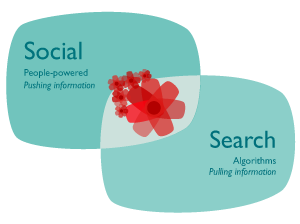As the World Wide Web has developed and evolved the methods and strategies utilized for information discovery have also undergone tremendous growth and evolution. In the late 1990s portal and categorization technology from Yahoo dominated. If you wanted to find something, chances are a walk down Yahoo's categorization hierarchy was your starting point.
Over time as the web exploded in content and complexity and since human-curated categorization simply could not keep up with the growth, search took over as the primary tool for finding content. This market was led by Yahoo for a time, and eventually came to be dominated by Google. More recently, social discovery has come to rival search as a primary and important mechanism for surfacing important and meaningful web content. I know something is important, and quite likely worth my time and attention if a trusted friend or colleague has shared it on Twitter, or recommended it on Facebook.
But despite the obvious improvements in the underlying technology and usability exhibited by the evolution of discovery tools and methods, there still seems an element of inefficiency and imperfection in the strategies and actions that many of us leverage to find interesting information. Keeping informed of news and developments in our areas of interest, and perhaps most importantly, surfacing content and expertise in adjacent or complimentary spaces, the kinds of resources that are most likely to expose us to new thinking, ideas, and challenge our conception of the status quo, is increasingly seen as an endless, and hopeless struggle.
It is only logical that there is something next, something better and more effective than the combination of search and social curation and discovery that most of us have come to rely upon in an attempt to learn, adapt, and stay informed. What if the next development is a kind of new technology that not only presents you with a collection of relevant resources and links based on your active preferences and the content shared by your trusted networks, but is intelligent enough to predict what you will be interested in next, and offers information and insights based on a more informed prediction about not just what you may have liked in the past, but what is most relevant to you today, and quite likely tomorrow.
That is the basic premise behind an interesting startup from Finland called Futureful. Futureful is in the process of developing what they call a 'Predictive Discovery Engine'. What exactly is 'predictive discovery?' From the Futureful 'about' page:
Futureful’s predictive discovery engine analyzes relevant information flows to open up the potential future around you. We use a combination of personal, social and contextual filters to understand interests, influences and intentions, and provide you with inspiring seeds to play with. Then its up to you to pick and choose, discover and share.
I have to admit that while a little unsure about the specific ability of Futureful to build and successfully deploy the self-described predictive discovery engine, I do think that in time, and perhaps sooner than later a better, and more precise method and technology for information discovery and presentation will have to emerge. The current, seemingly unsustainable cycle of adding feeds to Google Reader, adding friends on the various social networks, and the development of new and improved mobile devices that provide constant access to all the noise, with only a passing ability to discover the signal will eventually have to change.
If you are like me, you might feel like you are reading every possible blog, news source, and mass media site you can find. You may have developed a large, diverse, and valuable set of networks across numerous social platforms. You are constantly reading, updating, reviewing, and sharing. But despite all this activity, you never shake the feeling that you are missing something. So you add 'more'. Another feed, another friend, an so on.
Perhaps we don't need more, we need more precise.
Perhaps we need a way to see the future before it arrives.
How about you - what do you do to try and manage the balance between information overload and the sense you are missing something?